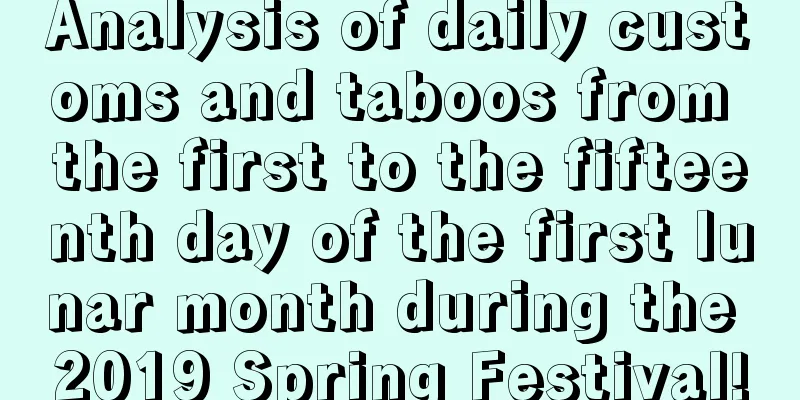Analysis of daily customs and taboos from the first to the fifteenth day of the first lunar month during the 2019 Spring Festival!

Introduction: The Spring Festival is a grand traditional festival. Here is an analysis of the customs and taboos from the first to the fifteenth day of the first lunar month during the 2019 Spring Festival! The festive culture of the Chinese New Year is rich and colorful, and extraordinary. If you want to know more related content, just search in the 2019 Chinese New Year and Spring Festival special topic carefully compiled by Shuimoxiansheng.com!Analysis of daily customs and taboos from the first to the fifteenth day of the first lunar month during the 2019 Spring Festival!The first day of the first lunar month: getting up early, opening the door, setting off firecrackers, greeting each other, giving lucky money, fortune-telling, pasting pictures of chickens, gathering wealth, and having a reunion dinnerThe Spring Festival, commonly known as the Chinese New Year, was originally called New Year's Day. It is the most important and grand traditional festival of the Han nationality. The main folk activities include paying New Year's greetings (paying New Year's greetings on the first day of the New Year must be to elders or neighbors, and people usually do not travel far to pay New Year's greetings), staying up all night, setting off firecrackers, pasting Spring Festival couplets, and giving out lucky money. According to legend, the monster Nian would come out to cause harm every New Year's Eve. People would scare the monster away by staying up all night and setting off firecrackers at midnight, so people would open their doors and congratulate each other on the morning of the first day of the New Year. The second day of the first lunar month: worship the God of Wealth (breaking the fast day), son-in-law festival The second day of the first lunar month is also a day for New Year's greetings, but on this day a married girl has to bring her son-in-law to her parents' home. Among them, there are many rules for newlyweds to visit their parents' home. When a daughter returns to her parents' home, she must bring a big bag of biscuits and candies, which her mother will distribute to neighbors and relatives, just like during the Chinese New Year. If there are multiple daughters in the family and they do not return on the same day, then the gifts will be shared one by one. The gifts are quite small, just four cookies. For example, all gifts must be brought in pairs. The woman’s parents cannot accept all of the gift, so she has to take some back when she returns to her husband’s home. However, the affection it reflects is very strong, and it is truly "the gift is small but the sentiment is great", and it expresses the girl's deep longing for her fellow villagers. On the second day of the Lunar New Year, according to folk customs, people basically do not visit relatives and friends' homes. If they must go, they should report to the homes on the first day and then go the next day. The custom of Fu'an people not visiting each other to wish each other a happy new year on the second and fifth days of the Lunar New Year was thus formed and strictly followed. The third day of the first lunar month: burning door god paper, Guzi’s birthday, Xiaonianchao Also known as Xiaonianchao or Chigou Day, as an ancient traditional festival of the Han nationality, it is said that on this day Nuwa created the sheep. According to Han Chinese folk legend, the third night of the Chinese New Year is the day when mice get married, so most families turn off the lights and go to bed early to avoid disturbing the mice (some say that turning off the lights early at night is to prevent the mice from seeing and getting married, thus reducing their reproduction rate). They also sprinkle some rice grains and cakes in the corners of the house for the mice to eat, which is called "mouse sharing", and means sharing the year's harvest with the mice. The Han Chinese people regard the third day of the first lunar month as the birthday of millet. On this day they offer sacrifices and pray for a good harvest and do not eat rice. In Hong Kong, people generally do not pay New Year's greetings on the third day of the Lunar New Year, because the third day of the first lunar month is "Red Mouth", also known as "Red Dog Day". It is said that Chigou is the god of anger and encountering him is likely to cause quarrels. Therefore, the older generation of Hong Kong's New Territories indigenous people stay at home on this day to avoid encountering evil spirits. The fourth day of the first lunar month: Sheep Day The fourth day of the first lunar month is also known as Sheep Day. It is the day when the Han people welcome gods. In the old imperial calendar, the sheep is the zodiac sign, so the phrase "three sheep (yang) brings good luck" is a symbol of good luck and is also the day to welcome the Kitchen God back to the people. On the fourth day of the Lunar New Year, the whole family eats Zheluo together. The so-called Zheluo is a hodgepodge of leftover food from the past few days. They also clean up the house and collect garbage into one place, which is also called "throwing away poverty" in Han folk customs. There is also a legend that the Kitchen God will come to check the household registration on this day, so it is not advisable to travel far. In the old days, most shops would host a banquet for their employees on the fourth night of the New Year and distribute red envelopes. There was an old saying in Beijing in the past: "I'm not afraid of heaven or earth, but I'm afraid of the shopkeeper speaking Mandarin on the fourth night of the New Year." There were wine and food at the banquet, and the custom was to eat buns after drinking. The shopkeeper then raised his glass to congratulate everyone and said "thank you for your hard work". This is called "official language". After the official speech, the buns were served. The shopkeeper picked up the buns himself and put them in the bowl of whoever the bun was placed in. That person was implied to have been fired. The fired person would automatically pack up his luggage and leave after the meal, so this banquet was commonly known as "eating the get-out buns." The fifth day of the first lunar month: welcoming the God of Wealth, the God of Road, sending away poverty, and opening the market The fifth day of the first lunar month is commonly known as the Po Wu Festival, because the Han Chinese folk custom holds that many previous taboos can be broken after this day. Since this day carries too many hopes and aspirations of the people, there were many taboos on this day in ancient times. For example, people had to eat dumplings, could not cook with raw rice, and women were not allowed to visit neighbors. This is a big day for businesses, as they pray for a prosperous year and welcome the God of Wealth. "Stores will open on this day and set off firecrackers." The sixth day of the first lunar month: Stone's birthday, send away the god of poverty The sixth day of the first lunar month is also known as Horse Day. Sending away poverty is a unique seasonal custom among the Han people. Different parts of China have their own ways of sending away poverty, and each one is different. But the meaning is basically the same, which is to send away the poor ghost. It reflects the traditional mentality of the Han people who generally hope to bid farewell to the old and welcome the new, to bid farewell to the poverty and hardship of the past and to welcome a better life in the new year. On the day of sending away the God of Poverty, you should do a thorough cleaning of the house and throw away all the garbage, useless clothes, etc. In addition, you also have to drink a vegetarian soup, which is made from seven kinds of vegetables including spinach and green vegetables. Stone's Birthday: This day is the birthday of stone, and all stone products cannot be used. According to folklore, the God of Poverty was the son of the ancient emperor Zhuanxu. During his lifetime, he liked to be frugal, wore tattered clothes, and ate porridge. Even if someone gave him clothes, he would put them in the fire and burn them. Legend has it that if a house is dirtier on the sixth day of the first lunar month, the God of Poverty will enter that house and cause financial loss. Therefore, garbage is thrown away on the sixth day of the first lunar month every year to drive away the God of Poverty. The seventh day of the first lunar month: Human Day, fish salad, pancake making, outing The seventh day of the first lunar month is said to be the birthday of mankind. People used to call this day "Renri", "Renri Festival" or "Rensheng Festival". On this day, the Han people celebrate by eating seven-treasure soup, noodles, climbing high places and composing poems. Folklore experts said that "Renri" reflects the desire of the ancient Chinese working people to pray for good luck and peace, as well as their respect for "human beings" themselves. In ancient times, there was a custom of wearing "Rensheng" on Human Day. Rensheng is a kind of headdress. Since the Jin Dynasty, people have cut ribbons into flowers, people, or gold foil into people to paste on screens, and they are also worn on the hair. In some areas of Shandong, there is a custom of sending torches. Torches made of crop straw are lit in front of people's doorsteps and sent out of the village. This is meant to drive away fire and pray for peace and safety in the new year. The eighth day of the first lunar month: Grain Day, Shunxing The eighth day of the first lunar month is also known as Shunxing Festival. On this day, people learn about astronomy by reading the names of the stars listed on the star god horses invited from the incense and candle shops. The star worship ceremony of Shunxing Festival is held at night. Rich families put up 108 lanterns, while ordinary families can put up 49 lanterns, and the minimum is 9, representing the nine fortune-telling stars: sun, moon, water, fire, wood, metal, earth, Luo Hou and Ji Du. The lamp bowl is shaped like a small goblet, made of clay or copper, with soybean oil inside, and the wick is made of "lamp flower paper". The ninth day of the first lunar month: the birth of the god of heaven The ninth day of the first lunar month is commonly known as Tian Gong Sheng, which is the birthday of the Jade Emperor, the highest god in heaven. Tian Gong is the Jade Emperor, the highest god in heaven. He commands all gods in the three realms and all spirits in the world, and represents the supreme heaven. According to the Han folk custom on this day, women often prepare fragrant flowers, candles, and vegetarian bowls, and place them in the open air at the entrance of the courtyard or alley to worship the sky and ask for blessings from the God. This expresses the Han working people's beautiful wish to ward off evil, avoid disasters, and pray for blessings. On the ninth day, family members are forbidden to dry clothes, especially women's pants and underwear, or empty the trash can, to show respect to the Jade Emperor. If livestock are to be used as sacrifices, they must be roosters, not hens. If you want to fulfill a vow, you must use a whole pig or a whole sheep. The tenth day of the first lunar month: Shi Budong, congratulations to the mouse for marrying his daughter It is called the Stone Festival, the birthday of the Stone God, and is also called the "Stone Mill Day", "Ten Sons Day", "Stone Does Not Move", etc. On this day, it is forbidden to move stones or stone tools such as millstones, grinders, and mortars, as it is believed that otherwise it will damage the crops. On this day, people are also forbidden to quarry stones or build houses with stones. There is also a custom of burning incense and worshiping stones, and offering pancakes at noon. In some places, the custom of carrying the stone god is popular: on the night of the ninth day of the lunar month, a clay pot is frozen on a smooth stone. On the morning of the tenth day, ten girls or young men take turns carrying the pot and running around. If the stone does not fall to the ground, it indicates a good harvest in the new year; if the stone falls to the ground, it indicates a bad harvest. The tenth day of the first lunar month is also known as the Mouse Wedding Day, commonly known as Ten Fingers. According to Henan custom, every family burns incense to pay tribute to the stone on this day. Steamed bread is a must for lunch, as it is believed that eating bread will bring prosperity for the next year. In places like Yuncheng, Shandong, there is a custom of carrying stone gods. The eleventh day of the first lunar month: Son-in-law Day, Walking the Colorful Bridge, Eating Laohezi, Paolong Festival, Celebrating the "Addition of a Child", Shangcai Day, Worshiping Zigu The eleventh day of the first lunar month is the day when the father-in-law entertains his son-in-law. There is a lot of food left over from the celebration of the God's birthday on the ninth day of the first lunar month, after being eaten for a day on the tenth day. Therefore, the bride's family does not have to spend any more money and can use the leftover food to entertain the son-in-law and daughter. This is called "Inviting the Son-in-law on the Eleventh Day" in the Han folk song. Binyang County in Guangxi holds a unique traditional festival of the Han nationality - the "Paolong Festival". Inviting Zi Gu Day: The earliest document recording "Zi Gu" is Yi Yuan by Liu Jingshu of the Southern Song Dynasty. Generally speaking, Zi Gu was someone's concubine who was envied by the original wife and was killed in the toilet on the fifteenth day of the first lunar month. The Emperor of Heaven took pity on her and made her the toilet god. The twelfth day of the first lunar month: setting up lantern sheds, fire-roasting festival, celebrating the Rat Festival, making dumplings, and "Dian Ding" day The Han folk activities on this day include hiding scissors, collecting old shoes, pinching mouse mouths, and setting up lantern sheds. Among the Han people in some areas in southern Shijiazhuang, the custom of roasting cypress fire on the twelfth day of the first lunar month is still preserved. Beijing’s customs include playing diabolo (the sound of harmony), shaking windmills (the sound of joy), beating gongs and drums (the sound of peace), and other recreational activities. People can also visit relatives and friends, travel together, make lanterns, and rehearse flower shows... The 13th day of the first lunar month: Lantern holder’s birthday, rolling dragon lanterns, making colored lanterns, eating glutinous rice balls, worshipping Guan Gong, making “holy insects”, worshipping the sea, and releasing sea lanterns The Han ethnic group has the custom of lighting lanterns from the 13th day of the first lunar month and putting them out on the 18th day. There is a saying that "on the 13th and 14th, the gods watch the lanterns, on the 15th and 16th, people watch the lanterns, and on the 17th and 18th, ghosts watch the lanterns." The 14th day of the first lunar month: drink bright eye soup, try lanterns, eat fermented rice soup, worship the water goddess, eat wheat, eat "hot spicy soup", Fuxi's birthday, guard the god of wealth, steal green, walk on the bridge, predict Zigu, predict Liuhua The fourteenth day of the first lunar month is the fourteenth day of the first lunar month. As one of the traditional lunar festivals of the Han nationality, the Han folk activities on this day include drinking bright eye soup, trying lanterns, eating fermented rice soup, and worshiping Linshui Niangniang. By this day, the New Year is basically over, and then it is the Lantern Festival on the fifteenth day of the first lunar month. After the Lantern Festival, the New Year is declared over. The 15th day of the first lunar month: Lantern Festival, Lantern Festival, eating Lantern Festival dumplings, performing social performances, walking away diseases, stealing vegetables, making zodiac animals, praying for dolls, wishing the old age, parading lanterns, listening to incense, burning fires, guessing lantern riddles, grabbing lantern furs On the night of the Lantern Festival, the streets and alleys are decorated with lights. People light up thousands of lanterns and go out with their relatives and friends to enjoy the lanterns, visit flower markets, set off fireworks, sing and dance to celebrate the Lantern Festival. The real driving force behind the Lantern Festival customs is that it is at a new point in time, and people make full use of this special time period to express their life wishes. The main Han folk activities during the Lantern Festival include dragon and lion dancing, land boat racing, stilt walking, and yangko dancing. The new wave of annual fortune in 2019 has already changed. Calculate your own fortune in advance, correct your mistakes if there are any, and encourage yourself if there are none, so that the new year will be smooth and safe. To calculate your new fortune in 2019, please click on the [Premium Calculation] below to learn about your new fortune. I wish you peace and happiness in the new year! |
<<: What are the do’s and don’ts on the fourth day of the first lunar month in 2019?
Recommend
Is it a good idea to get married on March 13th of the lunar calendar in 2019?
March is the beautiful month of spring. We all kn...
Is the fate of a girl born on March 16th of the lunar calendar in 2018, the Year of the Dog, good or bad?
Introduction: In the blink of an eye, the third mo...
Is the 18th day of the seventh lunar month in 2019 a suitable day for praying? What is the meaning of burning incense?
Introduction: Generally, you need to choose an aus...
Is December 24, 2021, an auspicious day for the Little New Year? Can I go to worship my ancestors and visit their graves?
December at the end of the year is the month when ...
Is August 25th of the lunar calendar in 2018 an auspicious day?
It is human nature to seek profit and avoid harm, ...
What zodiac sign and destiny will you have if you were born on September 22, 2022 in the lunar calendar?
Destiny is a combination of innate and acquired fa...
Is it good for a boy born on the tenth day of the third lunar month in 2022? Does he have a good fate?
The third month of the lunar calendar is when peac...
Where is the position of the God of Happiness on the tenth day of the sixth month of 2017? Where does the God of Happiness come from?
The arrival of the leap month of June in the luna...
How about the 14th day of the eighth lunar month in 2018? Is this day suitable for a haircut?
Introduction: Getting a haircut may seem like a no...
Is it a good idea to pick up the car on September 18th of the lunar calendar in 2017?
It is such a deep autumn, so golden, and so fruit...
Where is the God of Wealth on the 20th day of the third lunar month in 2022? Check the God of Wealth's location today
When worshiping the God of Wealth, one must not on...
How about the 26th day of the second lunar month in 2021? Can you pray?
Every day is good or bad, so let’s take a look at ...
Is it good to get pregnant during Xiaoshu? When is the expected date of delivery for pregnancy during the Lesser Heat period of 2019?
Is it good to get pregnant during Xiaoshu? When is...
What is the Chinese Valentine's Day? What are the traditional festival customs?
The Chinese Valentine's Day is one of our coun...
Can I go out during the night of the Ghost Festival? Who can’t go out? Can you go out the night before?
In our country, the Ghost Festival has many taboos...









